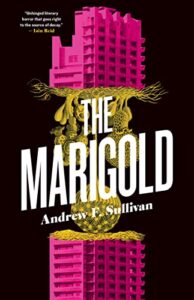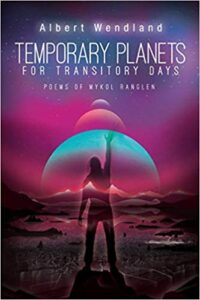The Marigold by Andrew F. Sullivan
ECW Press, 2023
ISBN: 9781770416642
Available: Paperback, Kindle edition
( Bookshop.org | Amazon.com )
The Marigold is a book readers will probably either love or hate: there won’t be a lot of in-between. It has a wildly inventive plotline revolving around city decay and revival, but its more literary style of prose may split readers: some will see it as genius, others as overly pretentious writing.
As noted, the plot is a true original, a nice horror-spiked take on urban blight. The book asks: what if there is a physical cause? That’s where the antagonist of the book, a fungus (or is it?) called the Wet, slides in, invading certain buildings in Toronto. Where the book really shines is playing with the possibilities throughout the book, never giving away too much. Is the Wet just an annoying mold? Can it infect people? Could there be intelligence directing it, or is it a sentient being in its own right? Scary possibilities! The author does a fantastic job leaving the avenues open, and it all becomes clear at the right time. He also avoids the usual big reveal at the end, and the story is much better for it. Tied in to this plot thread is another, the idea of actual sacrifices needing to be made to keep buildings standing upright. The two threads together make for a very creative knot in terms of story. Regardless of whether you like the book, one has to admire how well laid out the scenario is.
The book itself moves at somewhat of a “slow burn” pace, gradually picking up some speed, but it’s not a fast page-turner: it works best read in chunks. The characters push the story where it needs to go. They include a mix of health investigators, unscrupulous land developers, some nosy ordinary citizens, and a conspiracy theorist or two. All the pieces fit where they should in terms of character development, and there’s enough backstory for the characters to appear believable and generate emotion.
It’s the writing that is a blessing or a curse, depending on how you look at it. This isn’t straight-ahead Stephen King style writing, it’s more in the vein of T.E. Grau. The problem is, it doesn’t always work. The author is capable of reeling off beautifully written passages that would do a literature professor proud, and does it often. However, there are plenty of times where it winds up bogging down the story, instead of driving it. The main examples are the chapters dealing with how the Wet invades different apartments in the building called the Marigold, and what happens to the tenants. These chapters could have been trimmed down or slashed altogether. They muddle the pacing, and don’t add to the story. I started skimming those chapters, since I already knew how the chapters were going to end. Some of the character dialogue scenes suffered the same problem. They needed less fluff and more stuff. When it’s good, it’s very good, but the book lacks consistency.
Bottom line time: The Marigold has a lot of good qualities, but also some glaring deficiencies to overcome.
Recommended for readers who like what they read above. It’s not for all, but definitely for some.
Reviewed by Murray Samuelson







Follow Us!